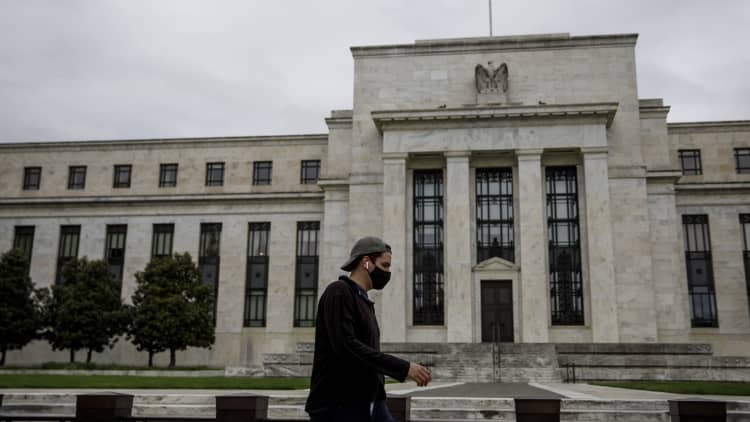
The Dow Jones Industrial Average and S&P 500 fell for a second straight day on Wednesday as traders once again took profits out of names benefiting from the economy reopening and rotated into mega-cap tech stocks.
The S&P 500 closed 0.5% lower at 3,190.17 while the Dow slid 282.31 points, or 1%., to 26,989.99 The Nasdaq Composite, meanwhile, jumped 0.7% to 10,020.35, marking its first-ever close above 10,000.
Shares of Amazon and Apple gained more than 1.7% each and hit all-time highs. Alphabet and Netflix rose 0.9% and 0.1%, respectively. Stocks that would benefit from the economy reopening — which have outperformed in recent weeks — fell broadly. American Airlines, United and JetBlue all dropped more than 8%. Wells Fargo slid nearly 9% while Citigroup lost 6.1%. JPMorgan Chase traded 4.1% lower.
"A large shift is occurring as investors cycle out of value/cyclical stocks for a second day and pour money into growth," said Adam Crisafulli of Vital Knowledge, in a note. "Keep in mind: investors never left growth/momentum. There was a brief flirtation w/cyclical-value over the last couple of weeks, but this was just rental positions held by tourists (growth is still home base for the majority of people in this market)."
Those moves came as Texas reported consecutive record surges in coronavirus-related hospitalizations while Arizona's hospitalization rate is also rising.
Despite Wednesday's losses, the Dow and S&P 500 remain more than 45% above their March 23 intraday lows.
"After such a ferocious run in recent weeks, the stock market was overdue for a correction or at least a pause," Jim Paulsen, chief investment strategist at the Leuthold Group, told CNBC. "Upside price momentum was becoming extreme and sentiment indicators a bit too bullish. Profit-taking won over [Tuesday], particularly in those economically sensitive area which have done the best in recent weeks."
"Being overweight stocks most sensitive to an economic revival worked well in recent weeks but not earlier in the year and not today," added Paulsen. "Alternatively, owning high-growth, new-era stocks worked well earlier in the year and did very well today but not in the last couple weeks."
No Fed rate hikes through 2022
The Federal Reserve kept interest rates unchanged on Wednesday and indicated it does not expect to raise them through 2022.
In a statement, the Fed said it "expects to maintain this target range until it is confident that the economy has weathered recent events and is on track to achieve its maximum employment and price stability goals." The committee added it will increase its bond holdings by buying $80 billion per month in Treasurys and $40 billion per month in mortgage backed securities.
The Fed also expects the U.S. economy to contract by 6.5% in 2020 before expanding by 5% in 2021.
"The Fed is going to continue to provide support for the economy," said Gregory Faranello, head of U.S. rates trading at AmeriVet Securities. "They view the U.S. economy as a victim of a pandemic."
Faranello added that "not everyone will agree with what the Fed is doing," but noted that "even as a market participant, it's hard to see the economic devastation that we've seen."
The benchmark 10-year Treasury yield fell to 0.74% while the 2-year rate dipped to 0.18%.
—CNBC's Jeff Cox and Michael Bloom contributed to this report.
Subscribe to CNBC PRO for exclusive insights and analysis, and live business day programming from around the world.



